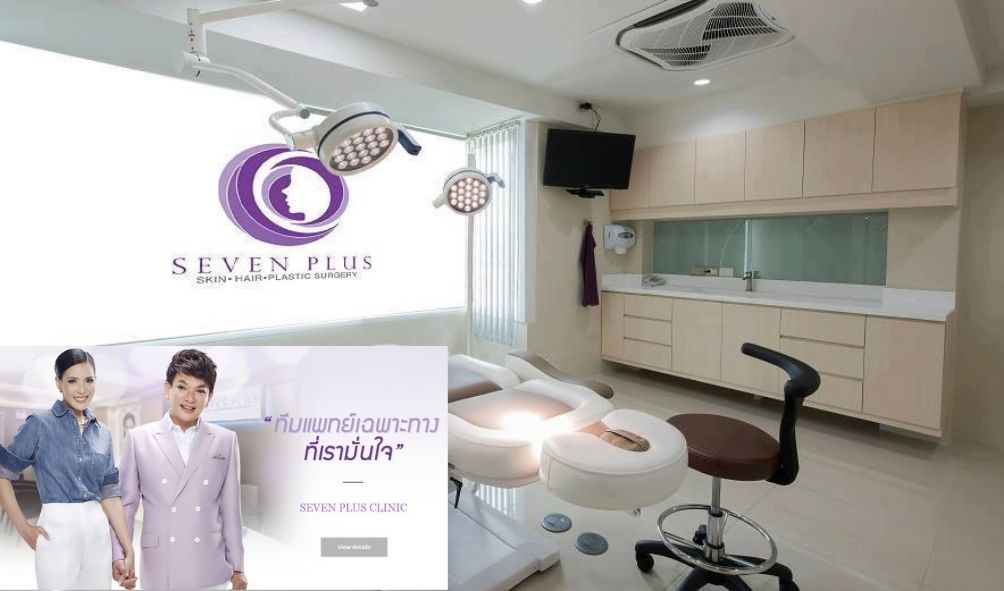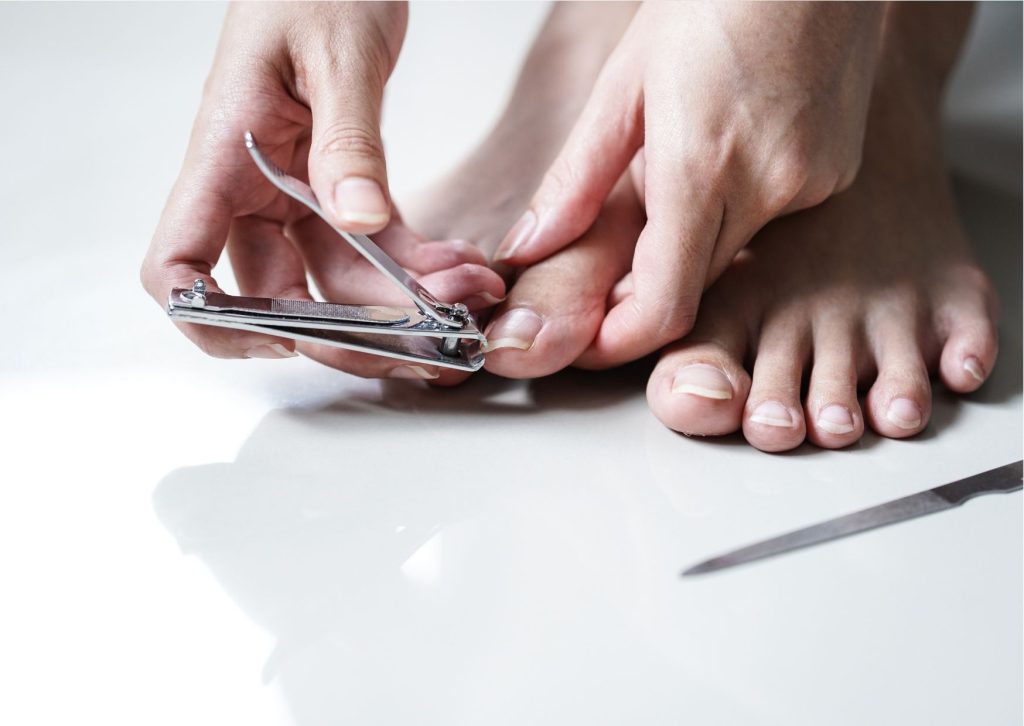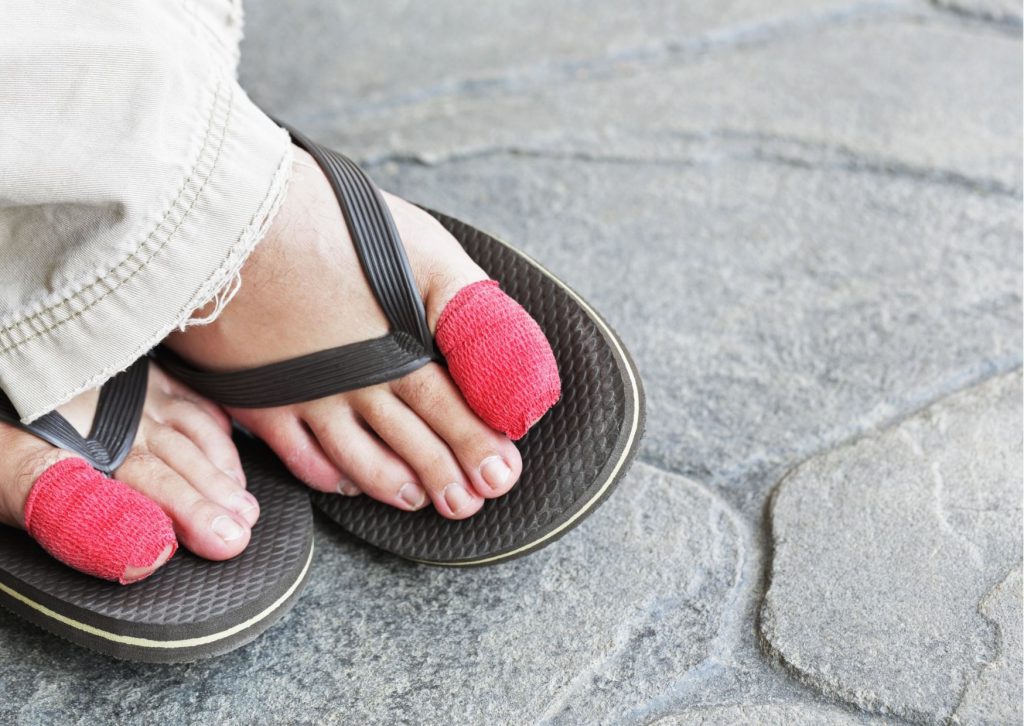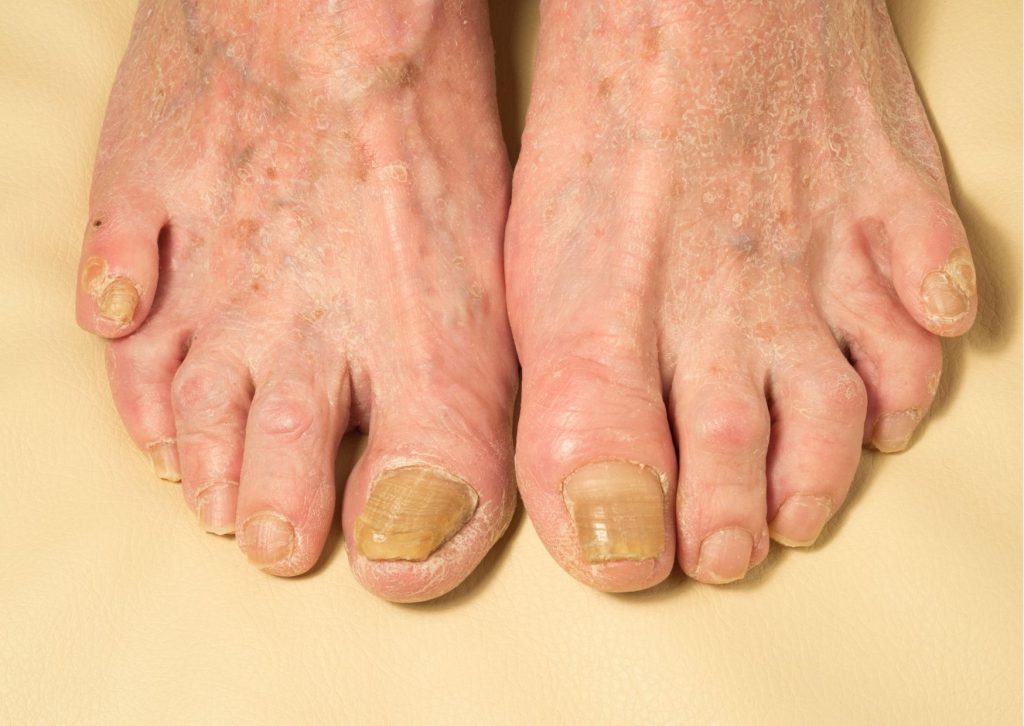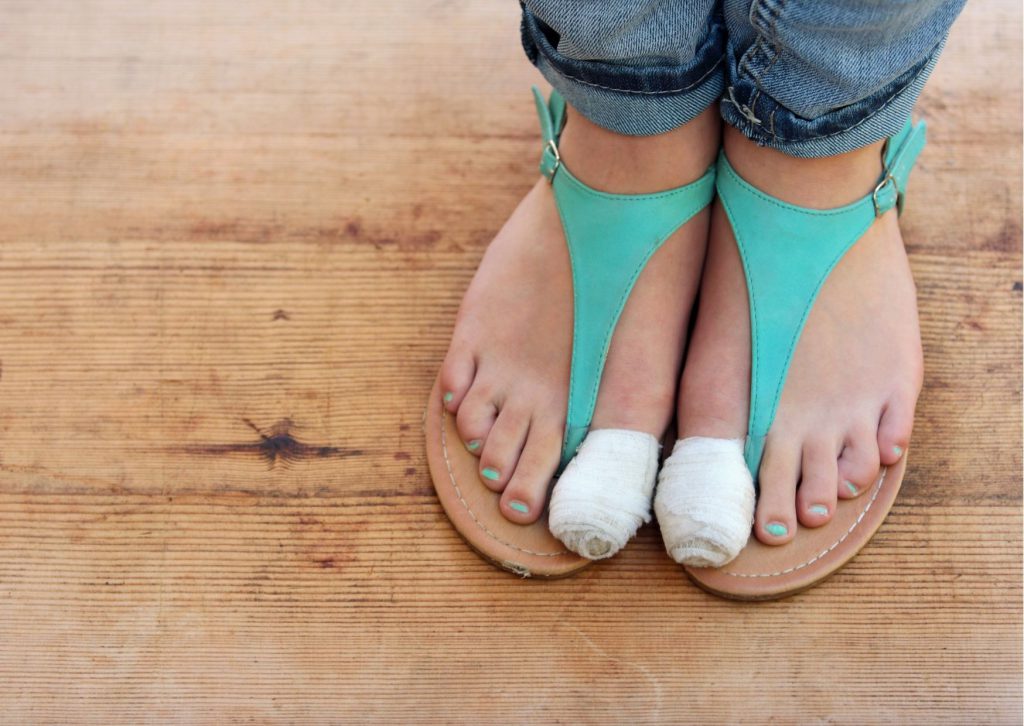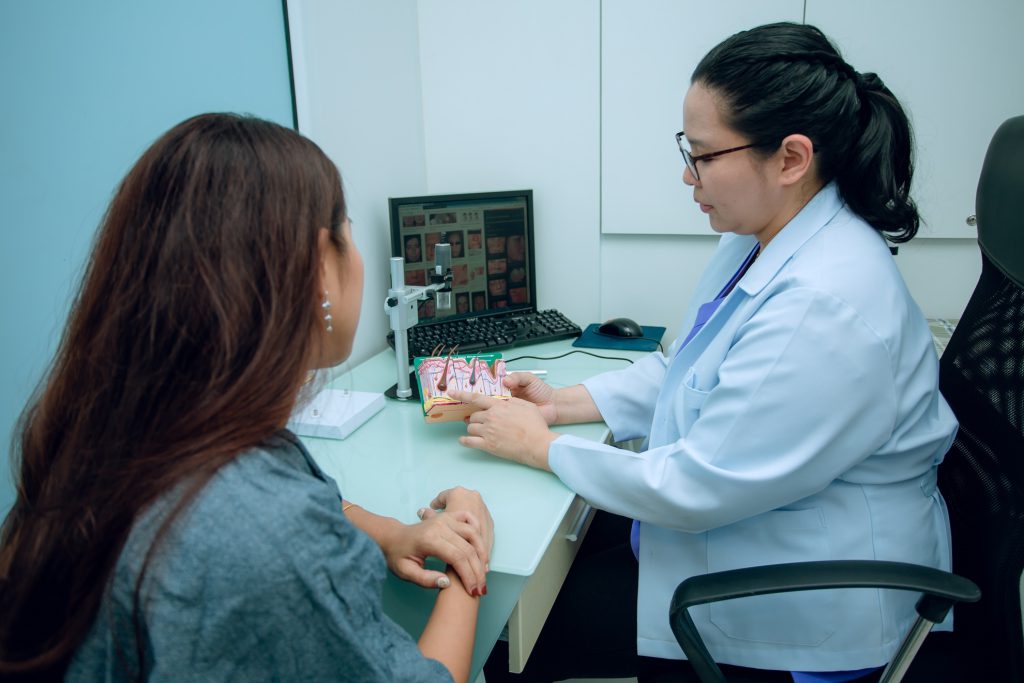Reviews a trusted nail treatment clinic near Pathum Thani
Nail disease
Nail disease is a term used to describe any condition that affects the health or appearance of the nails. Some common nail diseases include:
1. Fungal nail infection
This is a common nail disease caused by a fungus that can infect the nails and surrounding skin, causing discoloration, thickening, and brittleness.
2. Ingrown toenail
This occurs when the edge of the toenail grows into the surrounding skin, causing pain, swelling, and redness.
3. Psoriasis
Psoriasis is a chronic skin condition that can also affect the nails, causing thickening, ridges, and pitting.
4. Paronychia
This is an infection of the skin around the nail, which can cause pain, swelling, and redness.
5. Onychomycosis
This is a fungal infection that affects the nails, causing discoloration, thickening, and separation from the nail bed.
It is important to seek professional medical attention if you suspect that you have a nail disease, as some conditions can be more serious than others and may require specific treatment. Nail disease can often be treated with a combination of medication, lifestyle changes, and nail care practices.
Ingrown toenail disease
Treatment for ingrown toenail disease depends on the severity of the condition. In mild cases, soaking the affected toe in warm water and gently lifting the edge of the nail away from the skin can provide relief. In more severe cases, a doctor may need to remove part or all of the affected nail. Antibiotics may also be prescribed if there is an infection present.
Causes of Ingrown Toenail Disease
Ingrown toenail disease can be caused by a variety of factors, including:
- Improper nail trimming Cutting the toenails too short or rounding the edges can cause the nail to grow into the skin.
- Wearing tight shoes that are too tight or narrow can push the toenail into the skin.
- Trauma to the toe Injuries to the toe, such as stubbing or dropping something on it, can cause the nail to grow into the skin.
- Genetic factors Some people may be more prone to ingrown toenail disease due to their genetics.
- Fungal infections Fungal infections of the toenail can cause thickening and distortion of the nail, which can lead to ingrown toenail disease.
- Poor foot hygiene Poor foot hygiene can lead to bacterial or fungal infections, which can contribute to ingrown toenail disease.
It is important to take steps to prevent ingrown toenail disease, such as wearing properly fitting shoes, trimming toenails straight across, and maintaining good foot hygiene. If you have a history of ingrown toenail disease or are experiencing symptoms, it is important to seek medical attention to prevent further complications.
Infected nail disease
Infected nail disease refers to a condition where the nail and/or surrounding skin is infected by bacteria, viruses, or fungi. This can occur in both the fingernails and toenails.
Some common symptoms of infected nail disease include redness, swelling, pain, tenderness, and pus or discharge. The nail may also appear discolored or distorted.
There are several different types of infected nail disease, including:
- Fungal nail infection This is a common nail disease caused by a fungus that can infect the nails and surrounding skin, causing discoloration, thickening, and brittleness.
- Paronychia This is an infection of the skin around the nail, which can cause pain, swelling, and redness.
- Herpetic whitlow This is a viral infection of the finger or toe, which can cause painful blisters to form around the nail.
- Onychomycosis This is a fungal infection that affects the nails, causing discoloration, thickening, and separation from the nail bed.
Treatment for infected nail disease depends on the specific type of infection and its severity. In some cases, antifungal or antibiotic medications may be prescribed to treat the infection. In more severe cases, surgical intervention may be necessary to remove the affected nail.
Prevention of infected nail disease includes maintaining good hygiene practices, keeping the nails trimmed and clean, and avoiding sharing personal items such as nail clippers or shoes. If you suspect that you have an infected nail disease, it is important to seek medical attention to prevent further complications.
Curved nail disease
Curved nail disease, also known as nail clubbing or digital clubbing, is a condition in which the nails become curved and thickened, with the tips of the fingers or toes becoming enlarged and rounded. The condition can affect one or more fingers or toes.
Symptoms of Curved Nail Disease
Some common symptoms of curved nail disease include:
- Curved or spoon-shaped nails: The nails become curved downward, and the tips may appear rounded or spoon-shaped.
- Thickened nails The nails may become thickened or distorted.
- Increased angle between nail and nail bed The angle between the nail and the nail bed may increase, making the nail appear more elevated.
- Swollen fingertips or toes The fingertips or toes may appear swollen and rounded.
- Pain or discomfort In some cases, curved nail disease may cause pain or discomfort in the affected area.
It is important to note that curved nail disease is often associated with underlying medical conditions such as heart or lung disease, liver disease, inflammatory bowel disease, or cancer. If you experience any of the above symptoms, it is important to seek medical attention to determine the underlying cause and receive appropriate treatment.
If you have treated nails What are the dangers of making a mistake?
If you have had your nails treated, there are several potential dangers of making a mistake during the treatment process, including:
1. Infection
If the tools or equipment used during the treatment are not properly sanitized, it can lead to the spread of infection. This can cause pain, swelling, redness, and even fever in some cases.
2. Nail damage
Improper use of tools or techniques can cause damage to the nails, such as splitting, cracking, or peeling. This can be painful and may take time to heal.
3. Allergic reactions
Some people may be allergic to certain products or ingredients used during the treatment, such as acrylic or gel nails. This can cause a rash, itching, or swelling in the affected area.
4. Nail fungus
If the tools or equipment used during the treatment are not properly sanitized, it can lead to the spread of nail fungus. This can cause discoloration, thickening, and separation of the nail from the nail bed.
5. Ingrown toenails
Improper trimming of the nails can cause them to grow into the surrounding skin, leading to pain, swelling, and redness.
It is important to choose a reputable and experienced nail technician, and to communicate any concerns or questions you may have before and during the treatment process. It is also important to maintain good hygiene practices and take proper care of your nails after the treatment to minimize the risk of complications.
Hair disease
Hair disease refers to any condition that affects the health or appearance of the hair. There are several types of hair disease, including:
1. Alopecia
This is a condition that causes hair loss on the scalp or other parts of the body. There are several different types of alopecia, including androgenic alopecia (male or female pattern baldness), alopecia areata (patchy hair loss), and telogen effluvium (temporary hair loss due to stress or illness).
2. Dandruff
This is a common scalp condition that causes flaking and itching. It is often caused by an overgrowth of yeast on the scalp.
3. Scalp psoriasis
This is a chronic skin condition that can affect the scalp, causing redness, itching, and flaking.
4. Trichotillomania
This is a hair-pulling disorder that causes people to compulsively pull out their own hair, often resulting in bald patches.
5. Head lice
This is a hair-pulling disorder that causes people to compulsively pull out their own hair, often resulting in bald patches.
Treatment for hair disease depends on the specific condition and its severity. In some cases, medication or topical treatments may be prescribed to treat the underlying condition and alleviate symptoms. In more severe cases, surgical intervention may be necessary.
Prevention of hair disease involves maintaining good hygiene practices, such as washing the hair regularly and avoiding sharing personal items such as brushes and combs. It is also important to eat a healthy diet and manage stress levels, as these can affect the health of the hair and scalp.
Skin disease symptoms
Skin diseases can cause a range of symptoms, depending on the specific condition. Some common symptoms of skin disease include:
- Rash A rash is a common symptom of many skin diseases, and can present as redness, itching, bumps, or blisters on the skin.
- Itching or pruritus is a common symptom of many skin diseases, and can be caused by inflammation, dryness, or allergic reactions.
- Dry or scaly skin Dry or scaly skin can be a symptom of several skin diseases, such as eczema or psoriasis.
- Pain or discomfort Skin diseases such as shingles or herpes can cause pain or discomfort in the affected area.
- Blisters can be a symptom of several skin diseases, including herpes, chickenpox, and eczema.
- Skin discoloration Skin diseases such as vitiligo can cause loss of pigment in the skin, leading to patches of skin that appear lighter or darker than the surrounding skin.
- Swelling Skin diseases such as hives or angioedema can cause swelling of the skin or underlying tissues.
It is important to seek medical attention if you experience any of these symptoms or have concerns about the health of your skin. Early detection and treat
Advantages of nail treatment at SevenPlus Clinic and D’secert Clinic
Seven plus Clinic and D’Secret Clinic offer professional and high-quality nail treatment services. Some advantages of getting nail treatment at these clinics include:
1. Experienced and skilled staff Both clinics have experienced and skilled nail technicians who are trained in the latest nail techniques and technologies.
2. Quality products Both clinics use high-quality products and tools to ensure that the treatment is safe and effective.
3. Personalized service the nail technicians at both clinics provide personalized service, taking the time to understand each client’s unique needs and preferences.
4. Hygienic practices Both clinics follow strict hygienic practices to ensure that the tools and equipment used during the treatment are properly sanitized.
5. Relaxing atmosphere Both clinics offer a relaxing and comfortable atmosphere, allowing clients to relax and enjoy the treatment experience.
6. Range of services Both clinics offer a range of nail treatment services, including manicures, pedicures, nail art, and more.
7. Convenient locations Both clinics have convenient locations that are easily accessible and offer ample parking.
Overall, getting nail treatment at Seven plus Clinic and D’Secret Clinic can provide a safe, enjoyable, and effective experience for clients.
Dr. Marinya Pongpudpunth
Education of Dr. Marinya Pongpudpunth
- Hair Restoration Training, Korea (2015)
- Thai Board of Dermatology, Ramathibodi Hospital (2013)
- Board of Dematopathology, Boston University, USA (2009)
- Master of Science in Dermatology, Boston University, USA (2006)
- Doctor of Medicine, Mahidol University (2001)
- Nail surgery training
- Laser expert training
- Hair expert training
- Boton university usa
Work experience of Dr. Marinya Pongpudpunth
- Dermatologist Mae Fah Luang Hospital
- Dermatologist Ramathibodi Hospital
- Dermatologist, Samitivej Hospital
- Dermatologist, Bangkok Hospital
Treatment of nail disease near, Pathum Thani
SevenPlus Clinic
1. SevenPlus Clinic is a reputable nail care clinic that boasts a team of experienced and skilled nail technicians who are capable of identifying and treating various nail diseases.
2. They are equipped with high-quality products and techniques to deliver top-notch nail care services to their clients.
3. The clinic is also committed to ensuring the safety and health of their clients by adhering to strict hygiene standards.
4. With their expertise and commitment to excellence, Seven Plus Clinic is a trusted destination for individuals seeking professional and reliable nail care services.
D’secert Clinic.
1. D’secert Clinic is a nail treatment clinic that takes a holistic approach to nail care. In addition to providing aesthetic treatments, the clinic also focuses on the health of the nails and surrounding skin.
2. They offer customized treatment plans tailored to each client’s individual needs and concerns.
3. The clinic uses high-quality products that are safe and effective for the nails and skin.
4. Their team of professional and friendly staff are knowledgeable and skilled in their field, providing excellent service to their clients.
Choosing between Seven plus Clinic and D’Secret Clinic ultimately depends on personal preference and individual needs. However, clients can rest assured that both clinics offer high-quality services and a commitment to excellence in nail care.
